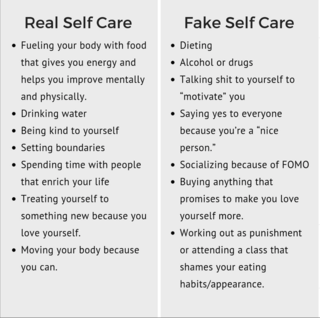Career
When Self-Care Becomes a Weapon
Which self-care practices actually work?
Posted July 12, 2019 Reviewed by Abigail Fagan
Every day we are bombarded with a new product that will save us. Many of these marketing efforts are directed at women. Women are struggling with their mental health at alarming rates. According to the American Psychiatric Association, each year 1 in 5 women in the United States struggles with a diagnosable mental health condition. Women are also twice as likely as men to experience generalized anxiety disorder or panic disorder.
Something has to be done, and the wellness industry is convinced they can solve the problem with new products and captivating marketing. Their version of self-care is expensive and doesn’t work very well, but wow, we are eating it up.
We want to feel good and we want to care for ourselves. But is self-care making us feel worse?
Self-care has become another item on our to-do list, something we have to do in order to feel loved, worthy, healthy, or respected. Sometimes this item doesn’t get checked off, and then the shame cycle begins. “I can’t believe I didn’t make it to the gym this week. I am such a failure. I never follow through on anything.”
I know. I’ve been this girl. The girl who picks an activity that is supposed to help me and then uses it as a reason to punish myself when I don’t follow through. I don’t think that’s how “self-care” is supposed to work.
Self-care is supposed to make us better in the long-term. It’s not supposed to be a quick fix or a punishment. Somewhere along the way, the term “self-care” sold its soul. Now we use self-care as a measuring stick for success. Maybe you compare yourself to the girl who does yoga six days a week or the vegan blogger whipping up gourmet meals.
We’ve been sold a lie that self-care comes in the tube of the latest lipstick or is at the bottom of a glass of wine. It has become exclusive, elusive, and so expensive. Self-care is officially a commodity and women are buying it off the shelves in order to prove that they care about themselves.

It’s time to take back self-care.
All that “stuff” we’re buying, it isn’t the real deal. Sadly, it will only make you feel good temporarily. It won’t make up for everything else in your life. You’ll just end up right back where you started.
Self-care happens in the decisions you make every day. It doesn’t always feel good at the moment, but it almost always leads to long-lasting change. We can’t just care for ourselves when things get bad and hope for a miracle. Real self-care requires practice, commitment, and introspection. It requires putting yourself first and getting in touch with what you really need, not just what you really want.
This is how you really practice real self-care.
- Get in touch with your feelings and actual needs. Most of us reach for all those fake self-care products as a way to cover up what we’re feeling. Reach for something that will help you experience your emotions. Calling a friend, moving your body, meditating, journaling, and going to therapy are all great ways to lean into a feeling rather than covering it up. Try to stay away from things that numb feelings like alcohol or drugs.
- Practice kindness. No feeling is final, even the good ones. You can say some variation of this to yourself: “Ok I am having this feeling. That’s ok. I am allowed to have this feeling.” You don’t react. You don’t judge.
- Ask yourself, “What do I need at this moment?” Again, the key word here is need, not want. Really look at the feeling and identify it. Then ask yourself, “What has helped me with this before?” If you’re stuck, take a moment to breathe. I recommend making a list of all the coping skills you have available to you. Having a list of available resources helps eliminate that whole autopilot sensation that happens when we become flooded by emotion and are searching for comfort.
Some self-care guidelines to follow:
- Drinking or using substances is not self-care. We cannot selectively numb emotions. If you numb the negative ones, you will numb the positive ones too. If you are really struggling with a particularly difficult or strong emotion, drugs won’t solve the problem. Sorry.
- Self-care has to happen regularly, not just when you hit a breaking point.
- Ask yourself what you need and respect that need.
- Self-care is not a to-do list item. It is a necessary long-term survival skill.
- There is no act of self-care that works for every person or every situation. The things I use change constantly.
Free self-care ideas:
- Set boundaries
- Drink water and eat food that fuels your body
- Turn off your phone when you go to bed
- Spend time with people you love
- Get outside every day
- Pet a dog or cat
- Speak to yourself kindly
- Tell someone you love them
- Practice meditation
- Log off social media for the day, the week, the year, or forever
- Organize some part of your home
- Practice forgiveness for yourself and others
- Cry or laugh
- Unfollow people on social media
- Move your body
These tips are simple, but they have to be done continuously. If you wait until you’re at a breaking point, cleaning your room and petting your dog won’t work fast enough. This may lead you back to ineffective coping skills that provide you with quick, fleeting relief.
The first step towards real self-care is believing you deserve it. Every single day. Not as a treat, not as a reward, but just because you are a human that needs it to live and thrive.
Facebook/LinkedIn image: Dejan Dundjerski/Shutterstock




